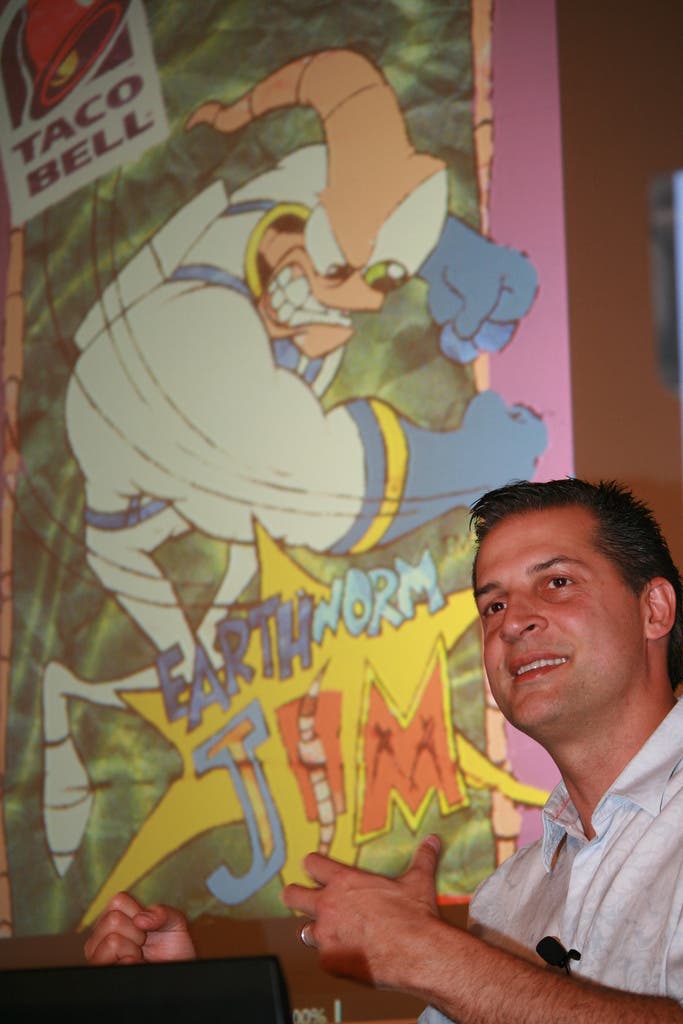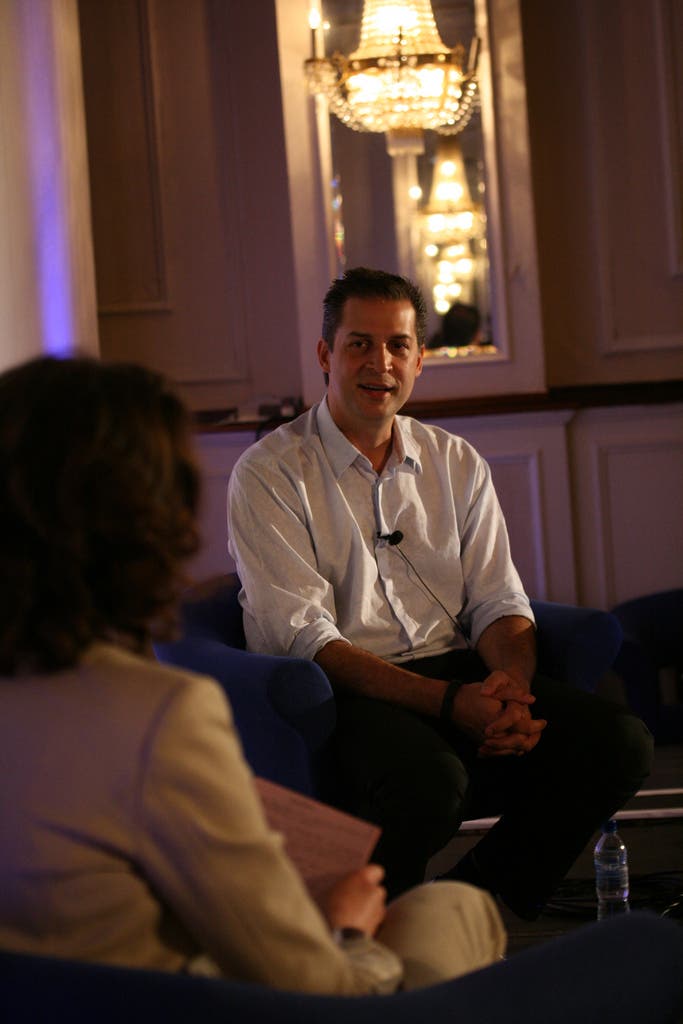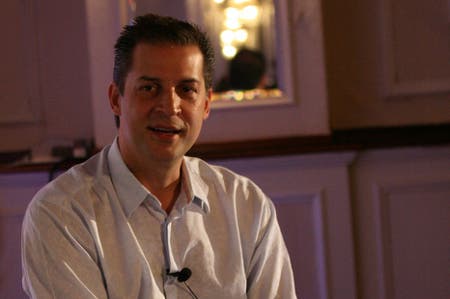Gaikai and Sony: Ladies and Gentlemen, Mr David Perry
"As they say, quids in!"
David Perry is rich. He's just sold Gaikai to Sony for a whopping $380 million. He should be on a California beach, sunny side up, Martini in one hand, Sixaxis in the other. But he's not. He's in rainy Brighton, talking to an audience at the Develop conference about the creation of Earthworm Jim, a game he coded 20 years ago.
But just how rich? "As they say, quids in!" he laughs when I ask him after his presentation. " I'm doing just fine. I've been very lucky. I'm doing just fine."
Of course, Perry won't tell me exactly how rich he is now he's got a corporate overlord to worry about. In the blink of an eye he's gone from being his own boss to being a Sony employee working under Kaz Hirai and Andrew House. He's having meetings with senior Sony executives right how to determine what his cloud gaming technology means for PlayStation. It's their company now, he tells me. It's their call.
We don't know what Sony will do with Gaikai, but we do have an idea of what Perry hopes they'll do. For one, he's hopeful Sony will slot cloud gaming into the PlayStation 4 as well as the PlayStation 3 and Vita. And there are rumblings Sony intends to use Gaikai to enable backwards compatibility for PSone and PS2. But Sony is more than game consoles. Perry predicts Gaikai will be fused with TVs, tablets and all the other screens that carry a Sony brand.
"That was a big deal. Crazy, isn't it?"
It sure was. For weeks leading up to the announcement rumours had pegged Sony as buying either Gaikai or bitter rival OnLive. We'd heard as much, too, but weren't sure which of the two Hirai and his chums had set their hearts on.
Perry knew, of course. He knew six months ago, when Sony first made its move. He knew when Eurogamer looked him in the eye and asked him straight up: is there a deal with Sony? A deal doesn't exist, he replied. Well...

"We had to juggle so many companies and so many deals, speaking everywhere, evangelising the concept," he says. "You're fighting against this alien concept people think is impossible. There are engineers on record saying it's impossible. There are still engineers saying it's impossible.
"I couldn't fully reveal what we were up to because then our competitors would be able to copy or do exactly the same thing."
Let's back up. Over the last year Perry has put everything into trying to convince the naysayers - and there are plenty - that cloud gaming actually works. And, amid all that, he's done deals with Samsung and LG to get Gaikai into smart tellies, picked away at the technology powering Gaikai to speed up compression and reduce latency - sometimes by only a few milliseconds - built more and more data centres closer to gamers to improve the service, added new, powerful hardware to the cloud, and signed up some 40 publishers and, thus, their games.
His message over the last year has been clear: cloud gaming is real, works and is the future. "At some point you're going to see a game you can't experience locally because you don't have the hardware to do it," he says, recounting his pre-deal mantra. "99.9 per cent of the world wouldn't want to buy that much hardware. When you see that you're going to want to play that. That's who we are as gamers. We go, whoa! That looks incredible. Oh, that doesn't run locally. You have to run it from the cloud. That for me would be the moment when the break comes, when cloud gaming will really hit its knee in the curve."
All these new moves, developments and announcements convinced Sony to make a move, Perry says. "Sony is one of the few companies watching all of this come together. Seeing us signing the number one retailer and the number one electronics retailer, we're the only people who can stream into Facebook and YouTube, our whole web strategy of being able to go directly into web pages made a big difference. We signed up 40 publishers. We got retailer number one and two.
"You're fighting against this alien concept people think is impossible. There are engineers on record saying it's impossible. There are still engineers saying it's impossible."
"That's what Sony's watching, going, it's the right time to jump in and grab this company."
Of course, Perry didn't have to sell up. He had enough venture capital to grow the business steadily over time - and he was seeing positive results. So why bother? The answer: it solves a problem with controllers.
Gaikai, which runs on almost all devices that aren't consoles, needs to retune PC games so they can work on a variety of input devices, including controllers. PlayStation 3 games all work with a Sixaxis controller. That's one controller to rule them all. In the blink of an eye, the problem solved.
"It turns out that if I want to go across a lot of devices, a standardised input device is very valuable to me," he says with a smile.
"I want content. Lots and lots of content. Everyone wants content. Sony's content is incredible. That standardised interface and controls... keyboard and mouse is great, but it means we had to keep looking at PC games going, oh my god, we're going have to get the source code and try to get this game to work with a controller. That was hard."

Meetings were taking place. Gaikai and Sony were becoming the real deal, slowly pulling back the virtual duvet in anticipation of jumping into bed with each other. But for Perry, there was no deal. Not until Sony signed on the dotted line would he allow himself to veer from the course he had so meticulously laid out for the company. For all he knew, Sony might have pulled the plug at the last minute.
"We'd been going a thousand miles an hour in a straight direction and Sony came in and said, okay, we're going to buy that company. And that takes six months. It's a long, long time of meetings and discussions before you buy a company, which means there's no deal. Until that ink is actually on the paper, there is no deal. I can't derail the company at all for a moment.
"So I had to go to E3 and do full presentations of Gaikai, because I'm going that direction, and until they sign a piece of paper, we're not slowing down for a second. That was our position."
Then, the deal was done. The ink was actually on the paper. And Perry, who will get to see the launch of a new console from the inside for the first time in his life, was, as he says, quids in.
I ask him if his life has changed. Sitting down next to the tall entrepreneur, I get a sense that the last few months have been a rollercoaster ride of emotions. I can understand that. The boy from Northern Ireland's Lisburn who left the UK to work in California for Virgin Games at the ripe old age of 24 has come a long way in just a few short years atop the cloud gaming revolution. It's not been easy. It's been hard.
And in our interview he's not his usual outspoken self. Again, I can understand that, given the sensitivity around PlayStation's new toy. He's happy to discuss the deal, but at arm's length. I get the impression he's unsure of the rules of engagement now he's part of one of the biggest consumer electronics companies in the world, and doesn't want to put his foot in it.
"You're fighting against this alien concept people think is impossible. There are engineers on record saying it's impossible. There are still engineers saying it's impossible."
Perhaps inevitably, he steers the conversation away from the personal to the business. His conversations with the industry will change, he says. He speaks now from a position of strength, a bit like when Julia Roberts returns to the fashion boutique in Pretty Woman with Richard Gere's credit card. Except, replace Julia Roberts with David Perry. And replace the credit card with a PS3.
"It's going to make the publishers very happy, because the publishers like PC, but they love console," he says with a glint in his eye. "The message I kept getting back was, PC is cool, but I wish you could do this with console. That's the real meat in our business. That would be really good.
"Of course, we had to go, look at this new PC stuff we have! We had to keep avoiding the console question. It's a very difficult question. If you look at the P&Ls of the publishers, that's such an important piece of their business. We were like, don't look over there. Focus on the PC.
"But the console question never went away. I had a major publisher recently say to me, David, just to be clear, the iPhone is interesting to us. Not as interesting as console. PC? Not as interesting as console. Just to be clear.
"The second thing they said was, if we're going to put our biggest games on your service, I've got to know you're going to have the financial muscle to support it. When you're a start-up, it's harder to answer that question. But when you've got Sony behind you, it's very easy to answer that question.
"There's multiple things that have been solved in a single deal. It's quite surprising. "
If Perry's life has changed, it is in business terms. He has always done pretty well for himself - first at Earthworm Jim developer Shiny Entertainment, which he sold to Interplay (the biggest mistake of his life, he says). Then at Gaikai, where he helped convince investors to part with millions. Now, he's ready for a new challenge - perhaps the greatest of his career.
"We were doing it the way you do it if you're a VC," he explains. "I have to start thinking differently now because I have one of the biggest consumer electronics companies in the world in our corner. So you have to think differently. I have to sit down and have a think about that. What does that mean as far as making new hardware? It's going to open a lot of doors that just weren't open before."
Hopefully, in among the meetings and conference calls, Perry will afford himself time to enjoy the moment. And if it all goes wrong? Well, one thing's for sure: he won't be short of cash.

